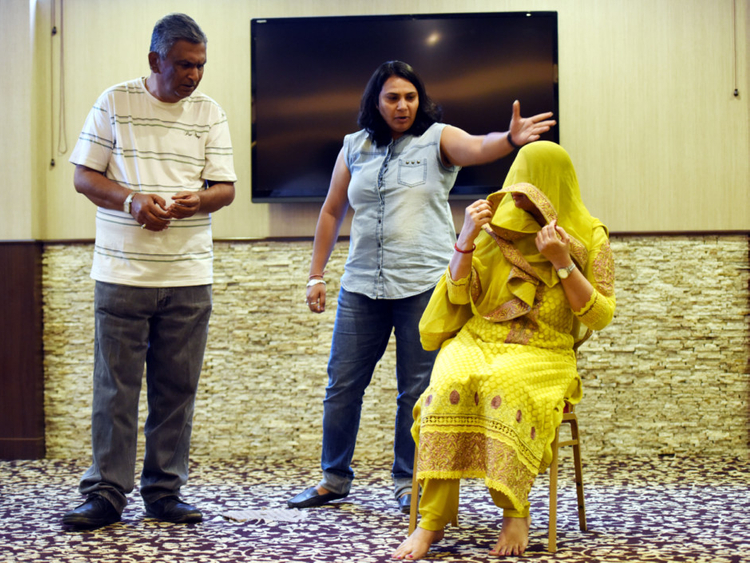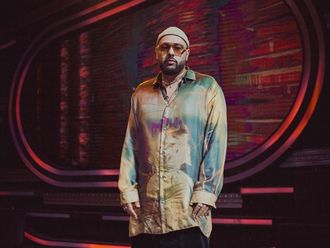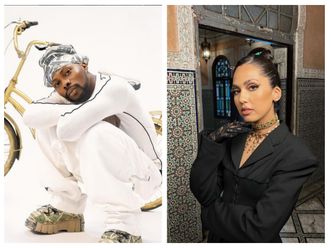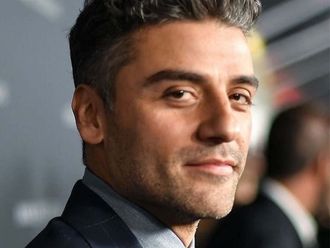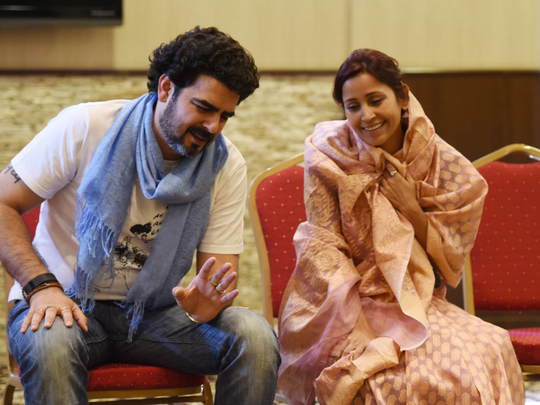
In four languages, through nine plays, close to 60 local artists will present The Great Indian Theatre Show this weekend at Emirates International Theatre.
“What theatre offers is a break from the monotony in our daily lives, giving us an outlet where we can experience a new adventure,” Sadia Noori of Socialciti, one of the organisers of the festival, told tabloid!. “There are people [in Dubai] who want to do theatre. But doing a full-length play is very difficult because a two-and-a-half hour show takes a lot of practice and years to actually present. We decided to break each show themed on language. Each of them will present three 30-minute plays. When we approached them, the Theatrewalas, with veteran Gujarati theatre enthusiast Dr Shailesh Upadhyay, came forward to do the Gujarati plays, Marathi Natakwalas offered to do the Marathi plays. For Hindi-Urdu plays we got on board Arif Bhaldar, who is another popular theatre actor-director in the UAE. He will be presenting Sandhya Chhaya. Another highlight of the show is a new play Lomadiyaan with known Indian TV actors Ashok Bhantia and Rajkumar Kanojia. It ran sold-out shows in Mumbai just days ago”.
Conceptualised in March, by Socialciti and Famous Monkeys — run by two UAE-based radio jockeys, Hansraj Shetty and Charu Shonek — it has taken nine months of “blood, sweat and tears, and sleepless nights” says Noori, a marketing manager, to organise the two-day event. They then approached local theatre groups.
“This came about because I attended a Gujarati play in Shaikh Rashid Auditorium and I didn’t expect more than 200 people there because I thought who would go watch a Gujarati play? But there were about a thousand, sharing ethnic snacks and enjoying the plays. Nobody moved out during the show’s two and a half hours. That’s where the idea for the theatre fest came about. I felt we had been underestimating regional languages and people do want to watch regional language theatre. We just hope Dubai will recognise all this hard work and welcome the festival with the same excitement that we have built it with,” she said.
The only brief the directors were given was to also think of the audience and not just about their creativity.
“We are tastemakers right now — we are building the taste for theatre for UAE audience right now. For this reason we cannot just impose our creativity on them. We are giving them a mix from which they can choose from”.
“[At The Great India Theatre Show] my aim is to present something which hasn’t been staged earlier,” said Upadhyay, who is directing all three Gujarati plays: Positive Thinking, Aataapataa and Kshdhaa. “When the festival organisers approached, I had all three plays ready. Unfortunately ours is the only group in Dubai that performs Gujarati theatre”.
The 62-year-old Dubai gynaecologist, who has been connected to the famous Indian People’s Theatre Association, says all three plays touch on social issues. While Positive Thinking deals with how social negativities affect our few positivities in life, Aataapaata reflects the communal living in Gujarat and sacrifice that neighbours who treat each other as family can make for each other. Kshdhaa is a play written by Upadhyay himself and he acts in it, too. The reason he says he does these plays is “first and foremost to make people learn about the latent talent in Dubai”.
“For the last 12 years I’ve been staging plays, in Hindi, English and Gujarati, here with the Theatrewala group. We’ve performed for small gatherings, and at Kilachand Theatre (Ductac) to full house in Shaikh Rashid Auditorium. Yes, we all go to watch plays staged by well-known groups and actors but it’s important to give a chance to the local people also. We have a treasure of talent here in all languages — Hindi, Urdu, Gujarati, Marathi, Tamil, etc. If we are encouraged we can deliver a lot more than we’ve been doing and it can become a sustainable activity. We are practically giving theatre in their language on a platter with the manageable ticket fees,” Upadhyay said.
Nilesh Deshpande, who is directing two of the Marathi plays, Never Mind and Nirnay, says he sees The Great Indian Theatre Show as a “good stepping stone for amateur artists here and gives an opportunity to interact with different artists in the UAE”.
Two of the three Marathi plays — Never Mind and Baby Birth — are comedies while Nirnay is a thriller-drama, says Deshpande.
“Marathi theatre is not just about comedy or being emotional. Never Mind is an intellectual comedy, Nirnay is a thriller-drama based on a real story by Makrand Marathe and Baby Birth is an innocent comedy. I had to really scratch my head to come up with these because even though they had to be different genres they had to be engaging and entertaining,” said Deshpande. “Today Marathi Natakwalas is a team of 35 to 40 actors, directors, writers and technicians. So now I know who to pick and when. The writers of these plays are very popular in India and just their names are enough to get people into the theatre. Moreover being experimental theatre, it brings different flavours of Marathi theatre.”
“All we just need is a little bit of push because there’s no dearth of talent and passion for theatre in this country,” said Shetty of Famous Monkeys, who is also acting in the play Sandhya Chhaya. “In fact this year I have seen so much theatre taking place here that it can only expand in the coming years. Also, what is required is little bit of awareness regarding the genre. We thought this sort of multilingual theatre festival hasn’t been held yet in the UAE, so why not do it? We want to set a benchmark as to how a multilingual show can be presented. Inshallah, next year we will do a bigger festival with more languages such as Bengali, Tamil, Assamese.”
What to watch
If you cannot watch all nine plays, do make time for these:
1) Kshdhaa (Gujarati)
This is a story of a middle-class, elderly couple who are caught in a hotel room during a police raid. The couple is dragged to the police station with suspicions of illicit relations.
“Kshdhaa is a play through which I wished to highlight the unique subject of sexual needs of the senior citizens which has always been swept under the carpet. We’ve just refused to acknowledge it, maybe because of social taboos or sweet ideas of young romance. I have been the butt of jokes by friends that it’s probably my personal experience. Even if it is, I want to highlight the subject and create an awareness about it,” said Dr Shailesh Upadhyay, a Dubai-based gynaecologist and theatre enthusiast who wrote, directed and acted in the play. “At the same time, I wished to bring forth the functioning of the Indian police department. So I created a story that narrates both these social points, yet in an entertaining manner”.
2) Sandhya Chhaya (Hindi)
An old couple feel abandoned when their only surviving child decides not to return to India soon after the news of their other son’s death at war breaks them. Learning that he has married without their knowledge, forget their permission is an added nail in the coffin. The fight between their love for him and their frustration regarding the fact that he does not understand their needs leads to a tragic decision.
“What is Sandhya Chhaya? It is a soulful experience,” said Arif Bhaldar, the director of the play. “So many people, like you and me, have come so far from home in search of a livelihood, with dreams of a happy and fulfilled life, and get caught up in the race to achieve them. It is not really wrong to dream but in this frenzy we leave behind a very important facet of our life — our parents. They are not interested in our earnings, don’t expect anything from us. They find happiness in our happiness and are proud of our successes. All they ask of us is a little attention, a little time to spend with us. I don’t say that we forget them but at times we may unintentionally ignore them. We need to consciously make sure that we don’t disconnect with them because no leaf can survive if it’s plucked from the tree. They may have lived their lives, but it is us who have such little time with them. And this play is full of these emotions. That’s why you need to watch it, especially with your parents. It is only when they are no longer with us that we realise what our parents really mean to us. Through this play we want people to learn to value them while they are with us”.
3) Never Mind (Marathi)
Ninad is an ambitious business professional who is in love with designer Smita, also a professional, but unable to express his feelings to her. Smita is also in love with Ninad, but is confused about whether she wants him to propose to her or express her the feelings first. Their mature minds — N and S — try to convince them to act in a mature way but Ninad and Smita decide to follow a different path.
“This is a story of a man and a woman and their respective minds. Sometimes your mind will tell you to do something but your physical activity is not in conjunction with the thought,” explained Prakash Kelkar who plays N. “N and S are Ninad’s and Smita’s mature minds. The play highlights the conflict between the mind and the person who has his or her own theories. People should come and watch what exactly this game is about. We all experience this game and that they will relate well with it. It’s a practical experience.”
4) Lomadiyaan — The Fox (Hindi)
Two hunters are looking for a fox in a jungle. Thirsty, hungry and bored of searching for a fox, one of them lies down and goes to sleep while the other curses the villagers for misguiding them. That’s when they encounter a goatherd who searching for a lost goat belonging to the ruthless village landlord.
“This play is about the powerful and the downtrodden. Lomadiyaan [fox] is a symbol of power. The protagonist is a goatherd looking for a goat that belongs to the zamindar or the landlord — a powerful man. As he searches in the jungle he comes across another power, the hunters who are looking for a fox. Now this man is caught between the huntsman and the landlord — two symbols of power. If we see society is a kind of jungle too. The huntsman goad the goatherd to fight social hierarchy and raise his voice against the landlord. But, due to his social and financial standing he fails and returns to the jungle, only to be hunted by the hunters,” said actor Ashok Banthia who plays one of the hunters.
5) Positive Thinking (Gujarati)
Mukesh, who seeks support from a godman to overcome his negative attitude towards life, finds himself in a situation where he doubts his wife’s character, finds reasons to get convince himself of her infidelity and ultimately commits suicide due to frustration.
“Positive Thinking is the survival struggle of modern-day middle-class dwellers with work and family pressures. In this struggle they start developing a negative thinking and approach to life, often turning to godmen for solace and assurance,” said Upadhyay, who directed the play. “Even though the godman has been telling the protagonist that positive thinking will solve most of his problems, he is enveloped by negativity when he’s back in to routine. If you see in the undercurrents of things, on stage also he loses his life. But that’s the [life] of the middle-class fellow in our society — that there’s no life. This is the battle between two sides of a coin where at the end of it negativity wins. These undercurrents speak of the social structure of Indian society”.
Don’t miss it
The Great India Theatre Show will be held on Friday, October 21, and Saturday, October 22, at Emirates International Theatre (Emirates International School Jumeirah). Tickets start at Dh50, call 055-7040393 or write to info@socialciti.com



